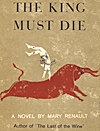 Pantheon, 1958, $?, ISBN ?, 339 pages, hardback
Pantheon, 1958, $?, ISBN ?, 339 pages, hardback
Set in ancient Greece, this book loosely follows the legend of Theseus and his journey in and around Greece. Born the son of a king, though he did not know it, he was raised in the house of another minor king.
Having learned the truth upon reaching the age of 17, he set off for Athens. Along the way, he meets a number of, er, legendary situations so beloved by Greek writers. Among them: defeating the baddest bandit of the Isthmus, wrestling a king of a minor matriarchical city state to the death (and becoming king himself), killing the baddest boar in the hills, outsmarting the witch of Athens, becoming heir, and finally, becoming a "bull-dancer" slave in Crete.
At this time, the Minoans were pre-eminent in the Aegean, receiving tribute from all the city-states its navy could reach and terrorize. Besides gold and foodstuffs, it included young boys and girls who would be trained for the bullring and dance with the bulls. In Renault's eyes, this was a combination of bullfight and gymnastics, and the Minoans would bet on the outcomes.
Those with a yen for ancient Greek history can sense what's coming-- the volcanic explosion in the Aegean which altered the landscape and seascape, and is often pointed to as the "real" Atlantis disaster.
Theseus manages to free the bull dancers via armed assault (helped by a healthy underground movement against the evil prince) and flee Crete--after vanquishing the "Minotaur" by the way.
Here, a very strange thing happens. As he sails off in true hero fashion, having saved the princess of Crete, they put into an island celebrating a bacchanalia. During the Marti-Gras, he becomes separated from the love of his life, and after the orgy, abandons her, on the island. It's a little unclear, for I had to re-read the section multiple times. And I'm still unclear as to the reason other then in her primeval state, the bloodlust took hold of her and took here away from him. I believe the young king of the island was eaten.
In any case, Theseus arrived back at home to Athens.
This was a better book than The Last of the Wine, in part because it offered a better story line, and in part because the characters were better woven into the fabric of the Greek tale.
Back to List of Book Reviews: Historical Fiction
Back to Master Book Review List
Back to Master Magazine List
© Copyright 2001 by Coalition Web, Inc.
This article appears in MagWeb.com (Magazine Web) on the Internet World Wide Web.
Other military history and related articles are available at http://www.magweb.com